Entrepreneurship, Small Business & Economic Impact in the UK
VerifiedAdded on 2023/04/05
|16
|4089
|248
Report
AI Summary
This report delves into entrepreneurship and small business management, focusing on the types of ventures, their impact on the UK economy, the entrepreneurial mindset, and the environments that foster or hinder entrepreneurship. It examines various entrepreneurial ventures, including small businesses, large companies, scalable startups, and social entrepreneurship, highlighting their similarities and differences. The report assesses the significant impact of micro and small businesses on the UK economy, emphasizing their role in social development and employment generation. Furthermore, it identifies the characteristics and skills of successful entrepreneurs, distinguishing them from business managers, and evaluates how background and experience influence entrepreneurial practices. The report also addresses the challenges posed by issues such as BREXIT and currency devaluation, underscoring the importance of supporting small and medium-sized enterprises for sustained economic growth. Desklib provides a platform to access similar solved assignments and past papers for students.
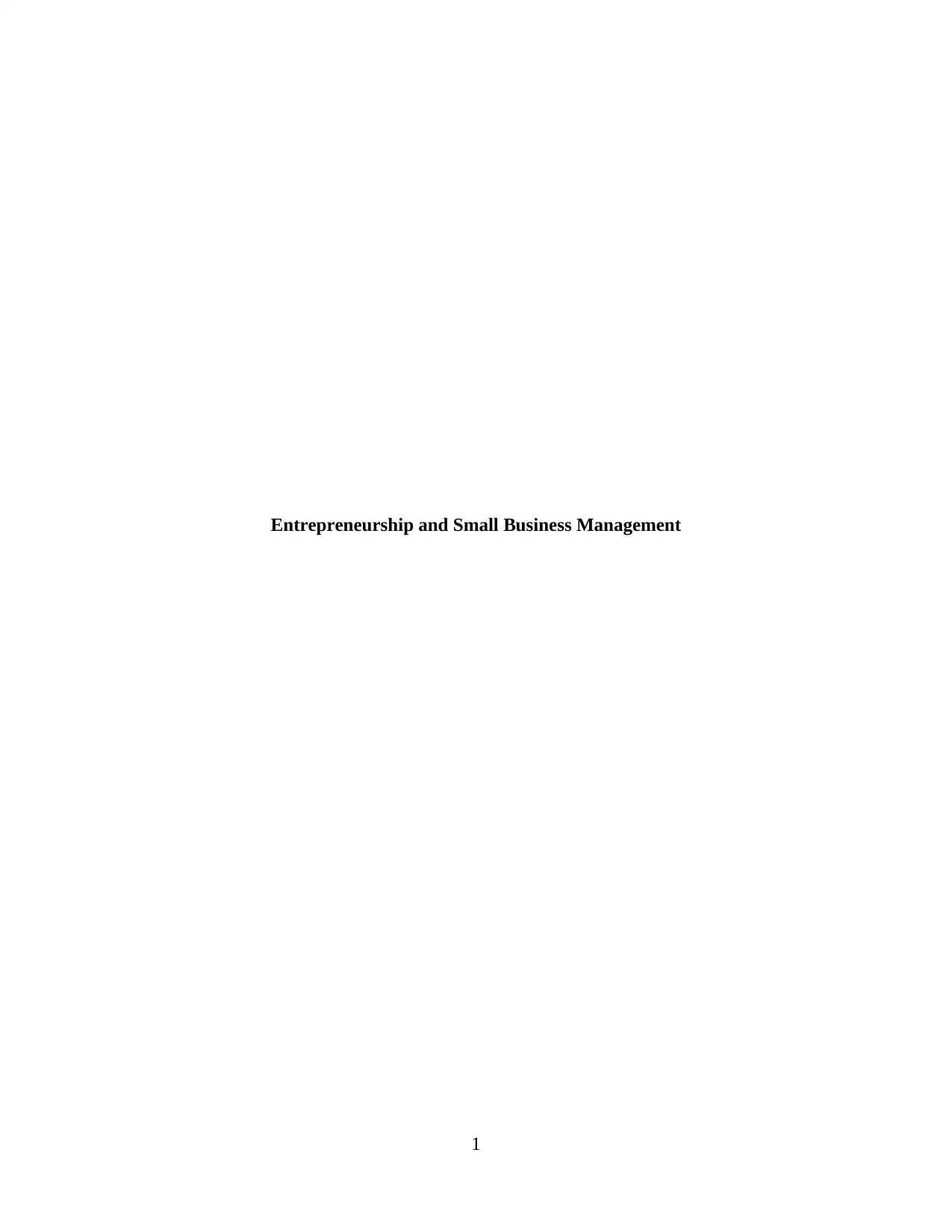
Entrepreneurship and Small Business Management
1
1
Paraphrase This Document
Need a fresh take? Get an instant paraphrase of this document with our AI Paraphraser
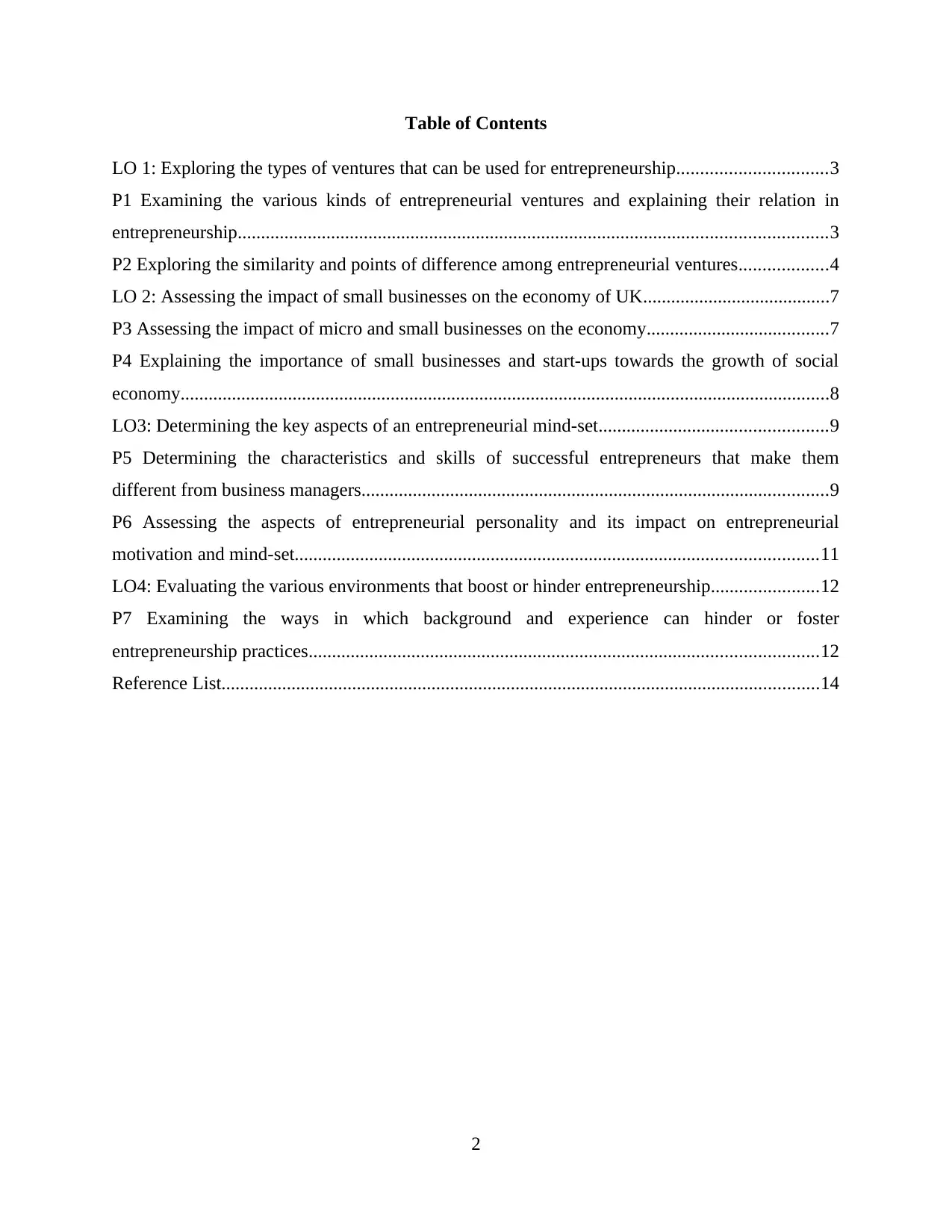
Table of Contents
LO 1: Exploring the types of ventures that can be used for entrepreneurship................................3
P1 Examining the various kinds of entrepreneurial ventures and explaining their relation in
entrepreneurship..............................................................................................................................3
P2 Exploring the similarity and points of difference among entrepreneurial ventures...................4
LO 2: Assessing the impact of small businesses on the economy of UK........................................7
P3 Assessing the impact of micro and small businesses on the economy.......................................7
P4 Explaining the importance of small businesses and start-ups towards the growth of social
economy...........................................................................................................................................8
LO3: Determining the key aspects of an entrepreneurial mind-set.................................................9
P5 Determining the characteristics and skills of successful entrepreneurs that make them
different from business managers....................................................................................................9
P6 Assessing the aspects of entrepreneurial personality and its impact on entrepreneurial
motivation and mind-set................................................................................................................11
LO4: Evaluating the various environments that boost or hinder entrepreneurship.......................12
P7 Examining the ways in which background and experience can hinder or foster
entrepreneurship practices.............................................................................................................12
Reference List................................................................................................................................14
2
LO 1: Exploring the types of ventures that can be used for entrepreneurship................................3
P1 Examining the various kinds of entrepreneurial ventures and explaining their relation in
entrepreneurship..............................................................................................................................3
P2 Exploring the similarity and points of difference among entrepreneurial ventures...................4
LO 2: Assessing the impact of small businesses on the economy of UK........................................7
P3 Assessing the impact of micro and small businesses on the economy.......................................7
P4 Explaining the importance of small businesses and start-ups towards the growth of social
economy...........................................................................................................................................8
LO3: Determining the key aspects of an entrepreneurial mind-set.................................................9
P5 Determining the characteristics and skills of successful entrepreneurs that make them
different from business managers....................................................................................................9
P6 Assessing the aspects of entrepreneurial personality and its impact on entrepreneurial
motivation and mind-set................................................................................................................11
LO4: Evaluating the various environments that boost or hinder entrepreneurship.......................12
P7 Examining the ways in which background and experience can hinder or foster
entrepreneurship practices.............................................................................................................12
Reference List................................................................................................................................14
2
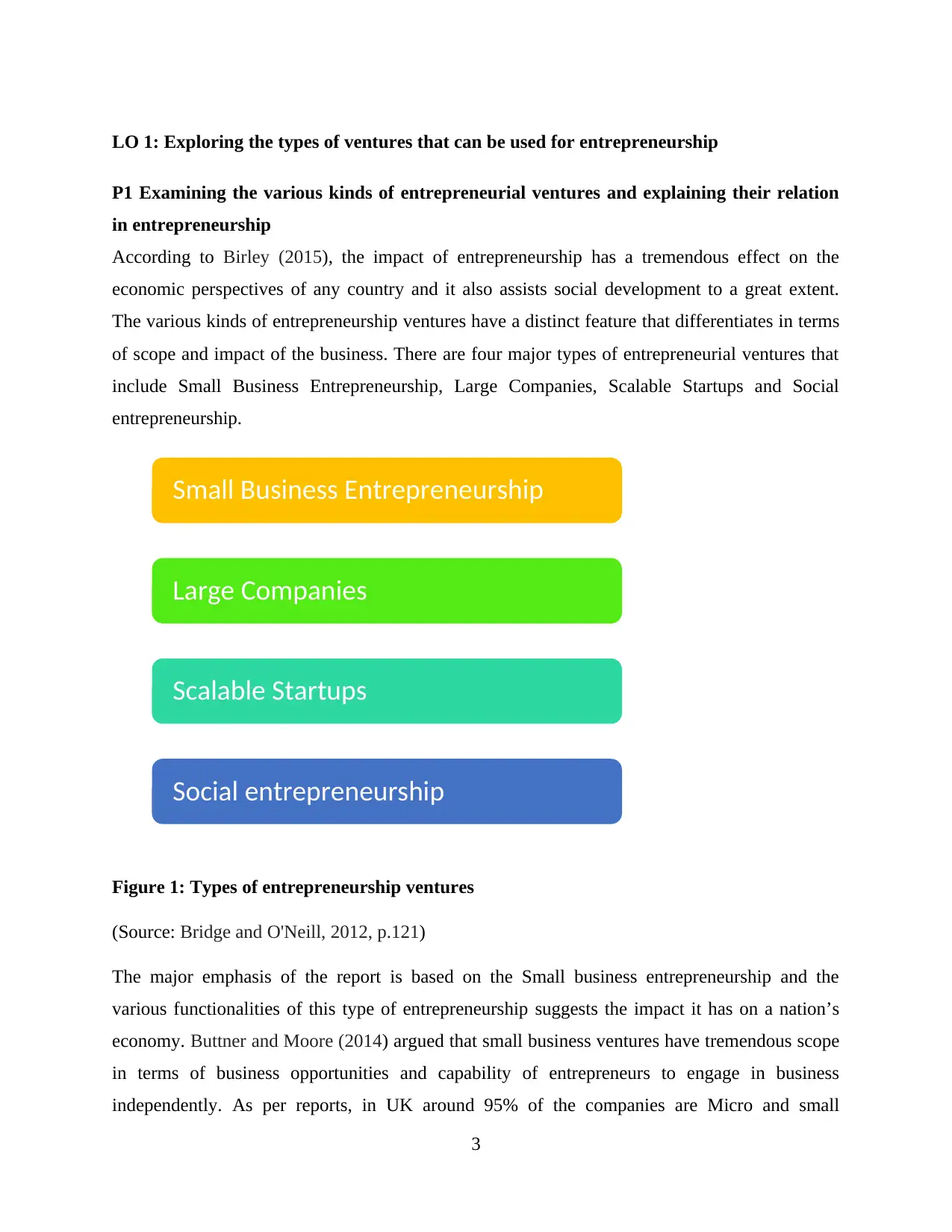
LO 1: Exploring the types of ventures that can be used for entrepreneurship
P1 Examining the various kinds of entrepreneurial ventures and explaining their relation
in entrepreneurship
According to Birley (2015), the impact of entrepreneurship has a tremendous effect on the
economic perspectives of any country and it also assists social development to a great extent.
The various kinds of entrepreneurship ventures have a distinct feature that differentiates in terms
of scope and impact of the business. There are four major types of entrepreneurial ventures that
include Small Business Entrepreneurship, Large Companies, Scalable Startups and Social
entrepreneurship.
Figure 1: Types of entrepreneurship ventures
(Source: Bridge and O'Neill, 2012, p.121)
The major emphasis of the report is based on the Small business entrepreneurship and the
various functionalities of this type of entrepreneurship suggests the impact it has on a nation’s
economy. Buttner and Moore (2014) argued that small business ventures have tremendous scope
in terms of business opportunities and capability of entrepreneurs to engage in business
independently. As per reports, in UK around 95% of the companies are Micro and small
3
Small Business Entrepreneurship
Large Companies
Scalable Startups
Social entrepreneurship
P1 Examining the various kinds of entrepreneurial ventures and explaining their relation
in entrepreneurship
According to Birley (2015), the impact of entrepreneurship has a tremendous effect on the
economic perspectives of any country and it also assists social development to a great extent.
The various kinds of entrepreneurship ventures have a distinct feature that differentiates in terms
of scope and impact of the business. There are four major types of entrepreneurial ventures that
include Small Business Entrepreneurship, Large Companies, Scalable Startups and Social
entrepreneurship.
Figure 1: Types of entrepreneurship ventures
(Source: Bridge and O'Neill, 2012, p.121)
The major emphasis of the report is based on the Small business entrepreneurship and the
various functionalities of this type of entrepreneurship suggests the impact it has on a nation’s
economy. Buttner and Moore (2014) argued that small business ventures have tremendous scope
in terms of business opportunities and capability of entrepreneurs to engage in business
independently. As per reports, in UK around 95% of the companies are Micro and small
3
Small Business Entrepreneurship
Large Companies
Scalable Startups
Social entrepreneurship
⊘ This is a preview!⊘
Do you want full access?
Subscribe today to unlock all pages.

Trusted by 1+ million students worldwide
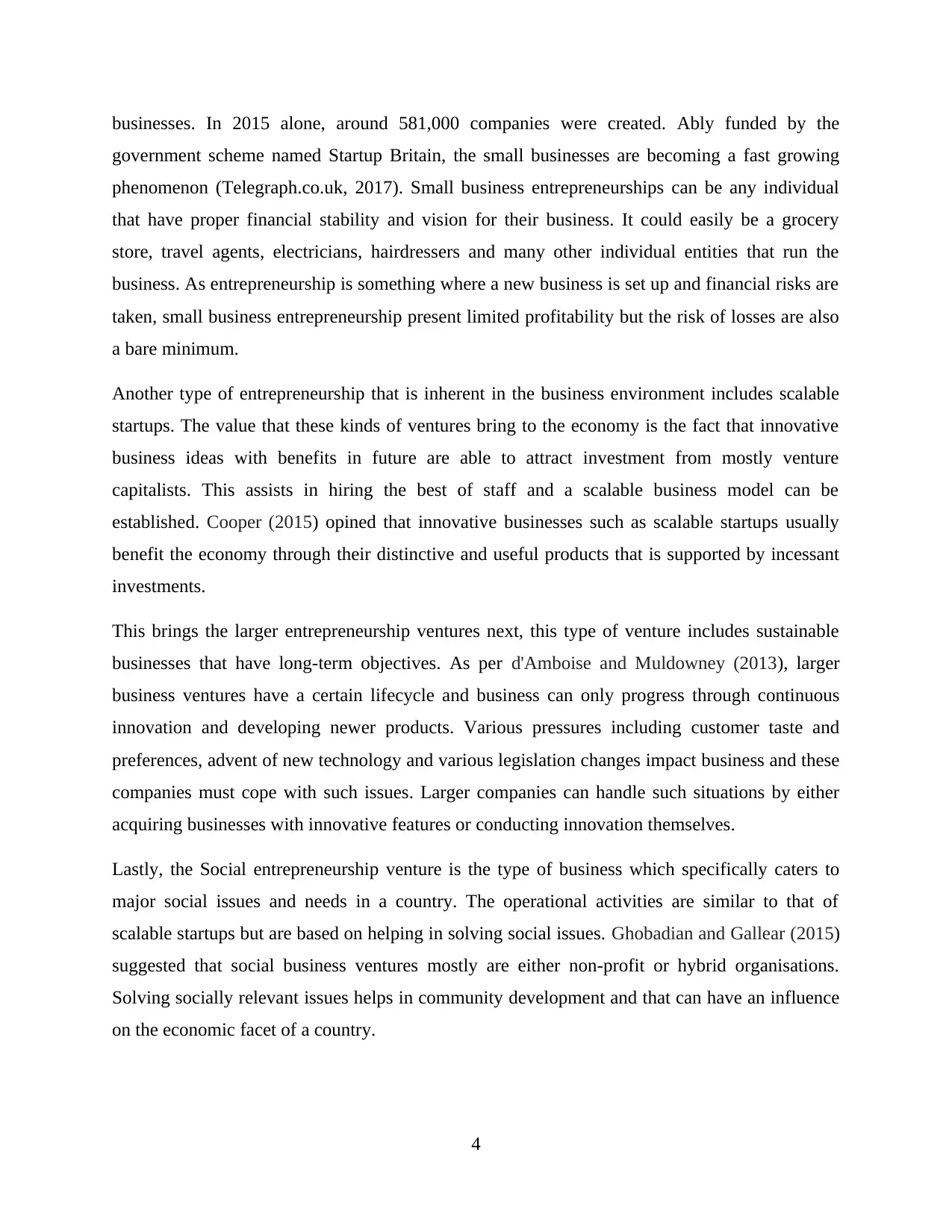
businesses. In 2015 alone, around 581,000 companies were created. Ably funded by the
government scheme named Startup Britain, the small businesses are becoming a fast growing
phenomenon (Telegraph.co.uk, 2017). Small business entrepreneurships can be any individual
that have proper financial stability and vision for their business. It could easily be a grocery
store, travel agents, electricians, hairdressers and many other individual entities that run the
business. As entrepreneurship is something where a new business is set up and financial risks are
taken, small business entrepreneurship present limited profitability but the risk of losses are also
a bare minimum.
Another type of entrepreneurship that is inherent in the business environment includes scalable
startups. The value that these kinds of ventures bring to the economy is the fact that innovative
business ideas with benefits in future are able to attract investment from mostly venture
capitalists. This assists in hiring the best of staff and a scalable business model can be
established. Cooper (2015) opined that innovative businesses such as scalable startups usually
benefit the economy through their distinctive and useful products that is supported by incessant
investments.
This brings the larger entrepreneurship ventures next, this type of venture includes sustainable
businesses that have long-term objectives. As per d'Amboise and Muldowney (2013), larger
business ventures have a certain lifecycle and business can only progress through continuous
innovation and developing newer products. Various pressures including customer taste and
preferences, advent of new technology and various legislation changes impact business and these
companies must cope with such issues. Larger companies can handle such situations by either
acquiring businesses with innovative features or conducting innovation themselves.
Lastly, the Social entrepreneurship venture is the type of business which specifically caters to
major social issues and needs in a country. The operational activities are similar to that of
scalable startups but are based on helping in solving social issues. Ghobadian and Gallear (2015)
suggested that social business ventures mostly are either non-profit or hybrid organisations.
Solving socially relevant issues helps in community development and that can have an influence
on the economic facet of a country.
4
government scheme named Startup Britain, the small businesses are becoming a fast growing
phenomenon (Telegraph.co.uk, 2017). Small business entrepreneurships can be any individual
that have proper financial stability and vision for their business. It could easily be a grocery
store, travel agents, electricians, hairdressers and many other individual entities that run the
business. As entrepreneurship is something where a new business is set up and financial risks are
taken, small business entrepreneurship present limited profitability but the risk of losses are also
a bare minimum.
Another type of entrepreneurship that is inherent in the business environment includes scalable
startups. The value that these kinds of ventures bring to the economy is the fact that innovative
business ideas with benefits in future are able to attract investment from mostly venture
capitalists. This assists in hiring the best of staff and a scalable business model can be
established. Cooper (2015) opined that innovative businesses such as scalable startups usually
benefit the economy through their distinctive and useful products that is supported by incessant
investments.
This brings the larger entrepreneurship ventures next, this type of venture includes sustainable
businesses that have long-term objectives. As per d'Amboise and Muldowney (2013), larger
business ventures have a certain lifecycle and business can only progress through continuous
innovation and developing newer products. Various pressures including customer taste and
preferences, advent of new technology and various legislation changes impact business and these
companies must cope with such issues. Larger companies can handle such situations by either
acquiring businesses with innovative features or conducting innovation themselves.
Lastly, the Social entrepreneurship venture is the type of business which specifically caters to
major social issues and needs in a country. The operational activities are similar to that of
scalable startups but are based on helping in solving social issues. Ghobadian and Gallear (2015)
suggested that social business ventures mostly are either non-profit or hybrid organisations.
Solving socially relevant issues helps in community development and that can have an influence
on the economic facet of a country.
4
Paraphrase This Document
Need a fresh take? Get an instant paraphrase of this document with our AI Paraphraser
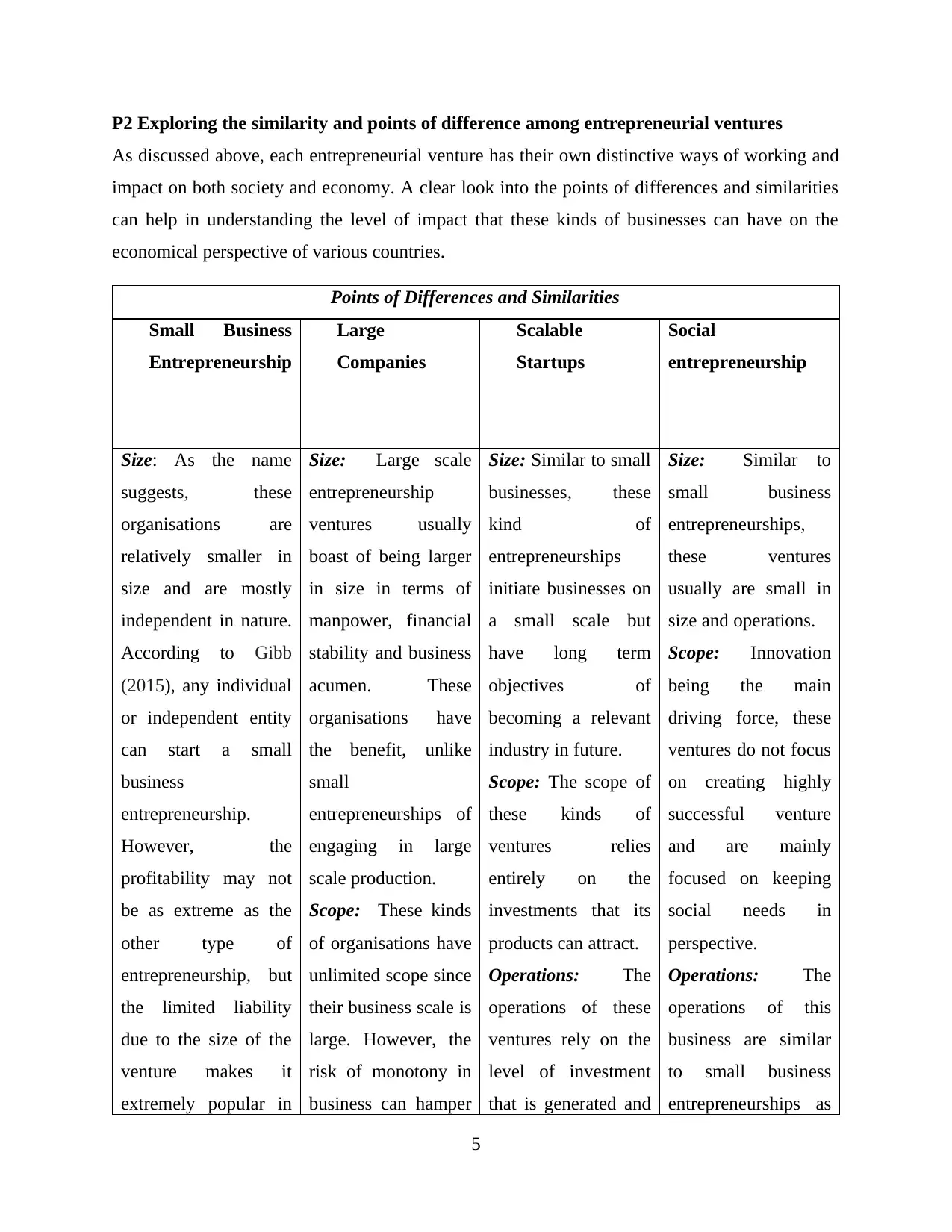
P2 Exploring the similarity and points of difference among entrepreneurial ventures
As discussed above, each entrepreneurial venture has their own distinctive ways of working and
impact on both society and economy. A clear look into the points of differences and similarities
can help in understanding the level of impact that these kinds of businesses can have on the
economical perspective of various countries.
Points of Differences and Similarities
Small Business
Entrepreneurship
Large
Companies
Scalable
Startups
Social
entrepreneurship
Size: As the name
suggests, these
organisations are
relatively smaller in
size and are mostly
independent in nature.
According to Gibb
(2015), any individual
or independent entity
can start a small
business
entrepreneurship.
However, the
profitability may not
be as extreme as the
other type of
entrepreneurship, but
the limited liability
due to the size of the
venture makes it
extremely popular in
Size: Large scale
entrepreneurship
ventures usually
boast of being larger
in size in terms of
manpower, financial
stability and business
acumen. These
organisations have
the benefit, unlike
small
entrepreneurships of
engaging in large
scale production.
Scope: These kinds
of organisations have
unlimited scope since
their business scale is
large. However, the
risk of monotony in
business can hamper
Size: Similar to small
businesses, these
kind of
entrepreneurships
initiate businesses on
a small scale but
have long term
objectives of
becoming a relevant
industry in future.
Scope: The scope of
these kinds of
ventures relies
entirely on the
investments that its
products can attract.
Operations: The
operations of these
ventures rely on the
level of investment
that is generated and
Size: Similar to
small business
entrepreneurships,
these ventures
usually are small in
size and operations.
Scope: Innovation
being the main
driving force, these
ventures do not focus
on creating highly
successful venture
and are mainly
focused on keeping
social needs in
perspective.
Operations: The
operations of this
business are similar
to small business
entrepreneurships as
5
As discussed above, each entrepreneurial venture has their own distinctive ways of working and
impact on both society and economy. A clear look into the points of differences and similarities
can help in understanding the level of impact that these kinds of businesses can have on the
economical perspective of various countries.
Points of Differences and Similarities
Small Business
Entrepreneurship
Large
Companies
Scalable
Startups
Social
entrepreneurship
Size: As the name
suggests, these
organisations are
relatively smaller in
size and are mostly
independent in nature.
According to Gibb
(2015), any individual
or independent entity
can start a small
business
entrepreneurship.
However, the
profitability may not
be as extreme as the
other type of
entrepreneurship, but
the limited liability
due to the size of the
venture makes it
extremely popular in
Size: Large scale
entrepreneurship
ventures usually
boast of being larger
in size in terms of
manpower, financial
stability and business
acumen. These
organisations have
the benefit, unlike
small
entrepreneurships of
engaging in large
scale production.
Scope: These kinds
of organisations have
unlimited scope since
their business scale is
large. However, the
risk of monotony in
business can hamper
Size: Similar to small
businesses, these
kind of
entrepreneurships
initiate businesses on
a small scale but
have long term
objectives of
becoming a relevant
industry in future.
Scope: The scope of
these kinds of
ventures relies
entirely on the
investments that its
products can attract.
Operations: The
operations of these
ventures rely on the
level of investment
that is generated and
Size: Similar to
small business
entrepreneurships,
these ventures
usually are small in
size and operations.
Scope: Innovation
being the main
driving force, these
ventures do not focus
on creating highly
successful venture
and are mainly
focused on keeping
social needs in
perspective.
Operations: The
operations of this
business are similar
to small business
entrepreneurships as
5
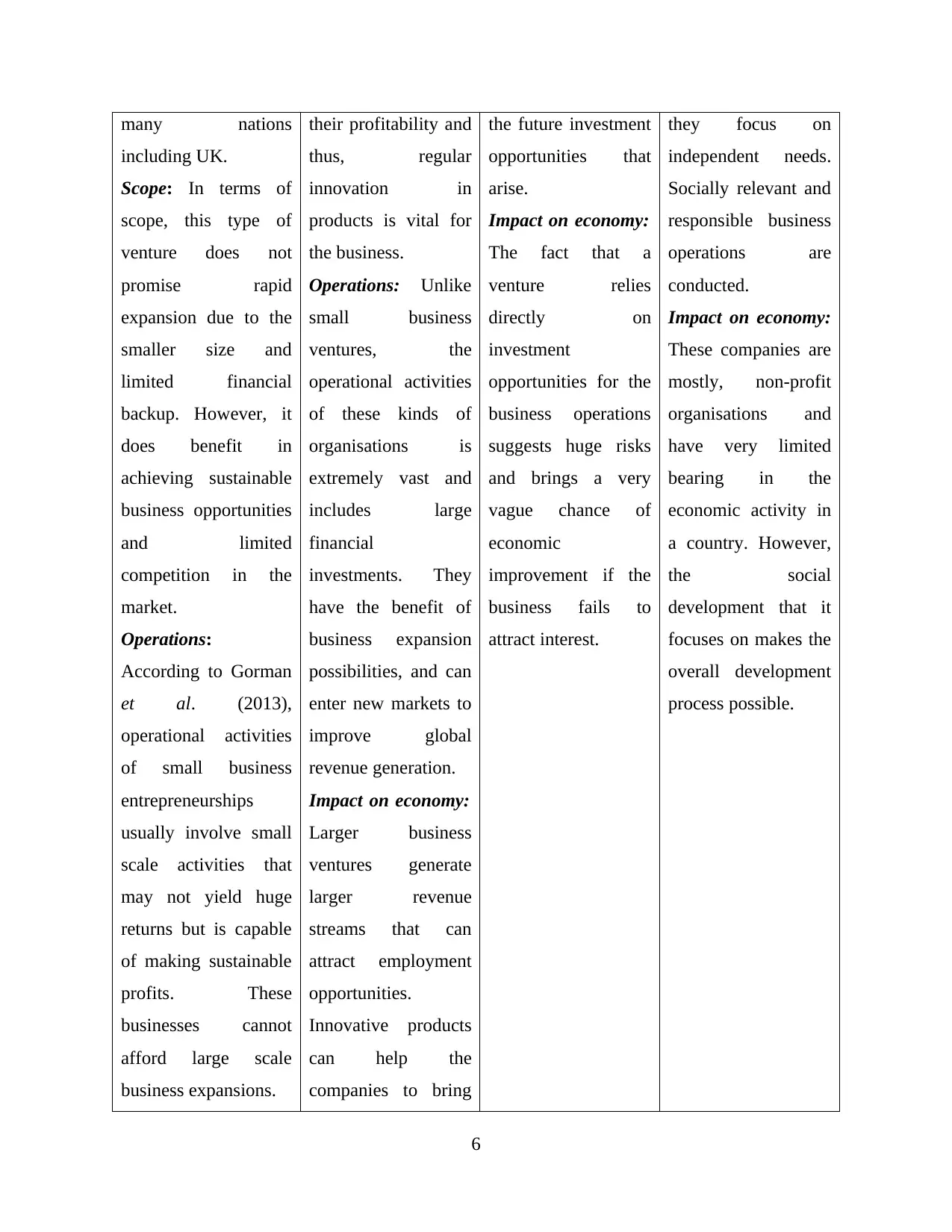
many nations
including UK.
Scope: In terms of
scope, this type of
venture does not
promise rapid
expansion due to the
smaller size and
limited financial
backup. However, it
does benefit in
achieving sustainable
business opportunities
and limited
competition in the
market.
Operations:
According to Gorman
et al. (2013),
operational activities
of small business
entrepreneurships
usually involve small
scale activities that
may not yield huge
returns but is capable
of making sustainable
profits. These
businesses cannot
afford large scale
business expansions.
their profitability and
thus, regular
innovation in
products is vital for
the business.
Operations: Unlike
small business
ventures, the
operational activities
of these kinds of
organisations is
extremely vast and
includes large
financial
investments. They
have the benefit of
business expansion
possibilities, and can
enter new markets to
improve global
revenue generation.
Impact on economy:
Larger business
ventures generate
larger revenue
streams that can
attract employment
opportunities.
Innovative products
can help the
companies to bring
the future investment
opportunities that
arise.
Impact on economy:
The fact that a
venture relies
directly on
investment
opportunities for the
business operations
suggests huge risks
and brings a very
vague chance of
economic
improvement if the
business fails to
attract interest.
they focus on
independent needs.
Socially relevant and
responsible business
operations are
conducted.
Impact on economy:
These companies are
mostly, non-profit
organisations and
have very limited
bearing in the
economic activity in
a country. However,
the social
development that it
focuses on makes the
overall development
process possible.
6
including UK.
Scope: In terms of
scope, this type of
venture does not
promise rapid
expansion due to the
smaller size and
limited financial
backup. However, it
does benefit in
achieving sustainable
business opportunities
and limited
competition in the
market.
Operations:
According to Gorman
et al. (2013),
operational activities
of small business
entrepreneurships
usually involve small
scale activities that
may not yield huge
returns but is capable
of making sustainable
profits. These
businesses cannot
afford large scale
business expansions.
their profitability and
thus, regular
innovation in
products is vital for
the business.
Operations: Unlike
small business
ventures, the
operational activities
of these kinds of
organisations is
extremely vast and
includes large
financial
investments. They
have the benefit of
business expansion
possibilities, and can
enter new markets to
improve global
revenue generation.
Impact on economy:
Larger business
ventures generate
larger revenue
streams that can
attract employment
opportunities.
Innovative products
can help the
companies to bring
the future investment
opportunities that
arise.
Impact on economy:
The fact that a
venture relies
directly on
investment
opportunities for the
business operations
suggests huge risks
and brings a very
vague chance of
economic
improvement if the
business fails to
attract interest.
they focus on
independent needs.
Socially relevant and
responsible business
operations are
conducted.
Impact on economy:
These companies are
mostly, non-profit
organisations and
have very limited
bearing in the
economic activity in
a country. However,
the social
development that it
focuses on makes the
overall development
process possible.
6
⊘ This is a preview!⊘
Do you want full access?
Subscribe today to unlock all pages.

Trusted by 1+ million students worldwide
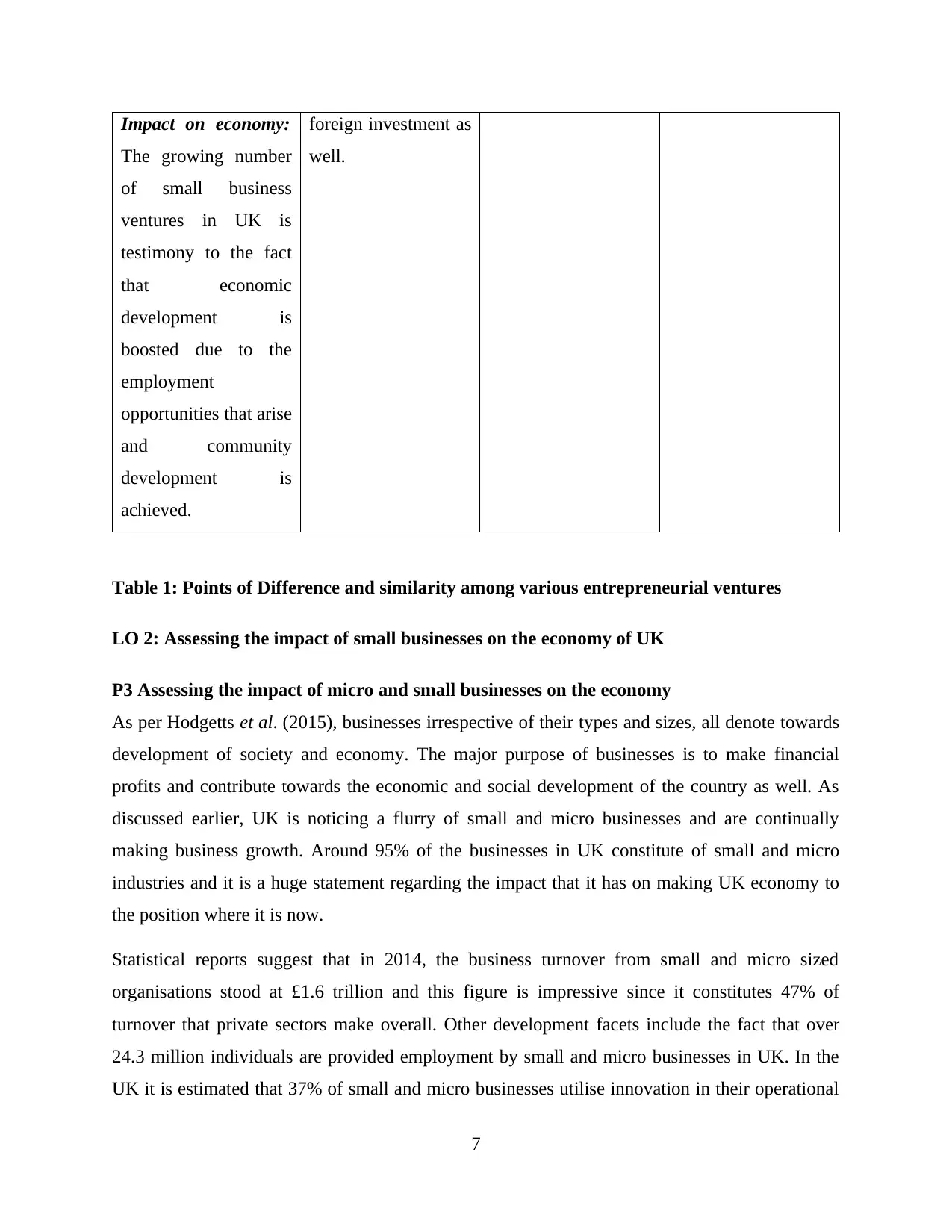
Impact on economy:
The growing number
of small business
ventures in UK is
testimony to the fact
that economic
development is
boosted due to the
employment
opportunities that arise
and community
development is
achieved.
foreign investment as
well.
Table 1: Points of Difference and similarity among various entrepreneurial ventures
LO 2: Assessing the impact of small businesses on the economy of UK
P3 Assessing the impact of micro and small businesses on the economy
As per Hodgetts et al. (2015), businesses irrespective of their types and sizes, all denote towards
development of society and economy. The major purpose of businesses is to make financial
profits and contribute towards the economic and social development of the country as well. As
discussed earlier, UK is noticing a flurry of small and micro businesses and are continually
making business growth. Around 95% of the businesses in UK constitute of small and micro
industries and it is a huge statement regarding the impact that it has on making UK economy to
the position where it is now.
Statistical reports suggest that in 2014, the business turnover from small and micro sized
organisations stood at £1.6 trillion and this figure is impressive since it constitutes 47% of
turnover that private sectors make overall. Other development facets include the fact that over
24.3 million individuals are provided employment by small and micro businesses in UK. In the
UK it is estimated that 37% of small and micro businesses utilise innovation in their operational
7
The growing number
of small business
ventures in UK is
testimony to the fact
that economic
development is
boosted due to the
employment
opportunities that arise
and community
development is
achieved.
foreign investment as
well.
Table 1: Points of Difference and similarity among various entrepreneurial ventures
LO 2: Assessing the impact of small businesses on the economy of UK
P3 Assessing the impact of micro and small businesses on the economy
As per Hodgetts et al. (2015), businesses irrespective of their types and sizes, all denote towards
development of society and economy. The major purpose of businesses is to make financial
profits and contribute towards the economic and social development of the country as well. As
discussed earlier, UK is noticing a flurry of small and micro businesses and are continually
making business growth. Around 95% of the businesses in UK constitute of small and micro
industries and it is a huge statement regarding the impact that it has on making UK economy to
the position where it is now.
Statistical reports suggest that in 2014, the business turnover from small and micro sized
organisations stood at £1.6 trillion and this figure is impressive since it constitutes 47% of
turnover that private sectors make overall. Other development facets include the fact that over
24.3 million individuals are provided employment by small and micro businesses in UK. In the
UK it is estimated that 37% of small and micro businesses utilise innovation in their operational
7
Paraphrase This Document
Need a fresh take? Get an instant paraphrase of this document with our AI Paraphraser
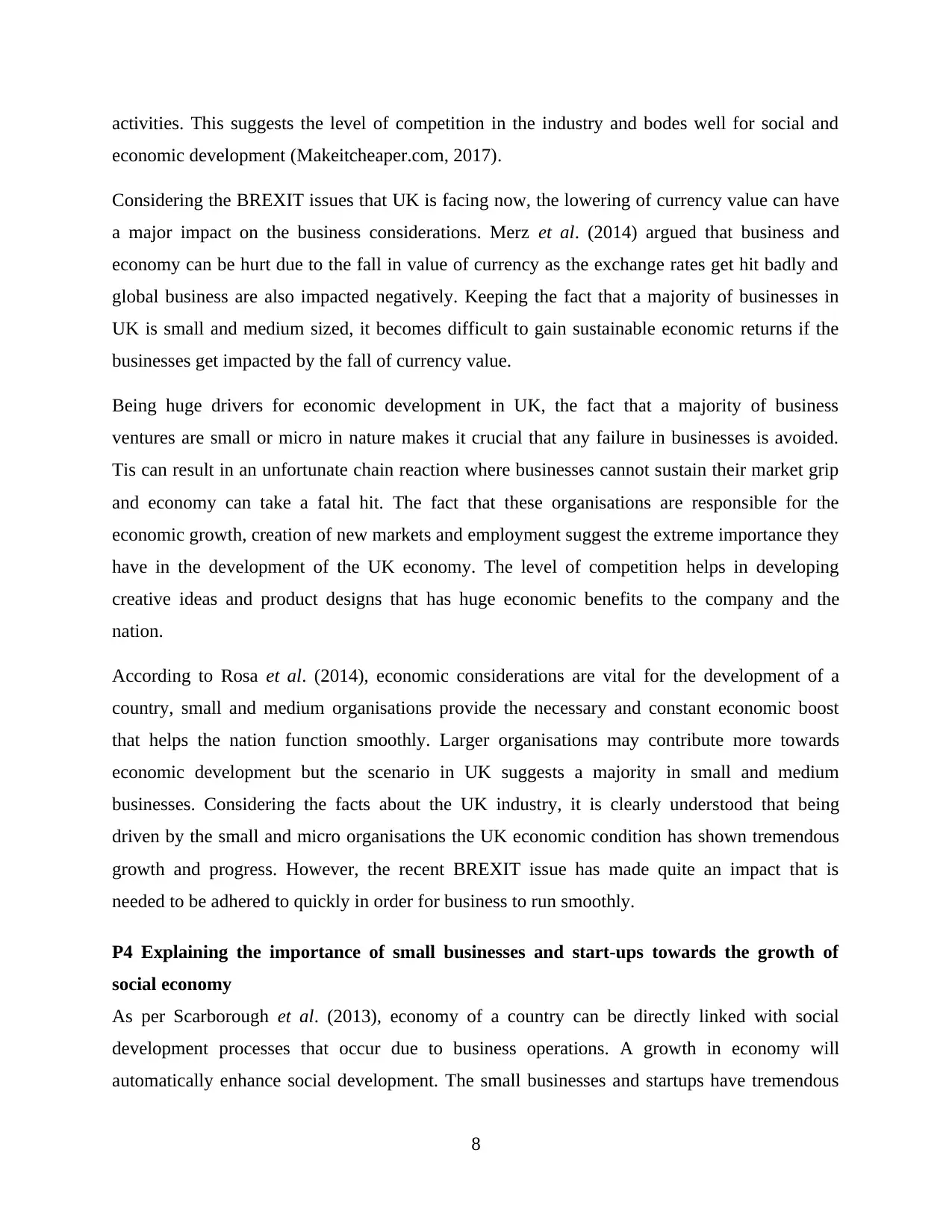
activities. This suggests the level of competition in the industry and bodes well for social and
economic development (Makeitcheaper.com, 2017).
Considering the BREXIT issues that UK is facing now, the lowering of currency value can have
a major impact on the business considerations. Merz et al. (2014) argued that business and
economy can be hurt due to the fall in value of currency as the exchange rates get hit badly and
global business are also impacted negatively. Keeping the fact that a majority of businesses in
UK is small and medium sized, it becomes difficult to gain sustainable economic returns if the
businesses get impacted by the fall of currency value.
Being huge drivers for economic development in UK, the fact that a majority of business
ventures are small or micro in nature makes it crucial that any failure in businesses is avoided.
Tis can result in an unfortunate chain reaction where businesses cannot sustain their market grip
and economy can take a fatal hit. The fact that these organisations are responsible for the
economic growth, creation of new markets and employment suggest the extreme importance they
have in the development of the UK economy. The level of competition helps in developing
creative ideas and product designs that has huge economic benefits to the company and the
nation.
According to Rosa et al. (2014), economic considerations are vital for the development of a
country, small and medium organisations provide the necessary and constant economic boost
that helps the nation function smoothly. Larger organisations may contribute more towards
economic development but the scenario in UK suggests a majority in small and medium
businesses. Considering the facts about the UK industry, it is clearly understood that being
driven by the small and micro organisations the UK economic condition has shown tremendous
growth and progress. However, the recent BREXIT issue has made quite an impact that is
needed to be adhered to quickly in order for business to run smoothly.
P4 Explaining the importance of small businesses and start-ups towards the growth of
social economy
As per Scarborough et al. (2013), economy of a country can be directly linked with social
development processes that occur due to business operations. A growth in economy will
automatically enhance social development. The small businesses and startups have tremendous
8
economic development (Makeitcheaper.com, 2017).
Considering the BREXIT issues that UK is facing now, the lowering of currency value can have
a major impact on the business considerations. Merz et al. (2014) argued that business and
economy can be hurt due to the fall in value of currency as the exchange rates get hit badly and
global business are also impacted negatively. Keeping the fact that a majority of businesses in
UK is small and medium sized, it becomes difficult to gain sustainable economic returns if the
businesses get impacted by the fall of currency value.
Being huge drivers for economic development in UK, the fact that a majority of business
ventures are small or micro in nature makes it crucial that any failure in businesses is avoided.
Tis can result in an unfortunate chain reaction where businesses cannot sustain their market grip
and economy can take a fatal hit. The fact that these organisations are responsible for the
economic growth, creation of new markets and employment suggest the extreme importance they
have in the development of the UK economy. The level of competition helps in developing
creative ideas and product designs that has huge economic benefits to the company and the
nation.
According to Rosa et al. (2014), economic considerations are vital for the development of a
country, small and medium organisations provide the necessary and constant economic boost
that helps the nation function smoothly. Larger organisations may contribute more towards
economic development but the scenario in UK suggests a majority in small and medium
businesses. Considering the facts about the UK industry, it is clearly understood that being
driven by the small and micro organisations the UK economic condition has shown tremendous
growth and progress. However, the recent BREXIT issue has made quite an impact that is
needed to be adhered to quickly in order for business to run smoothly.
P4 Explaining the importance of small businesses and start-ups towards the growth of
social economy
As per Scarborough et al. (2013), economy of a country can be directly linked with social
development processes that occur due to business operations. A growth in economy will
automatically enhance social development. The small businesses and startups have tremendous
8
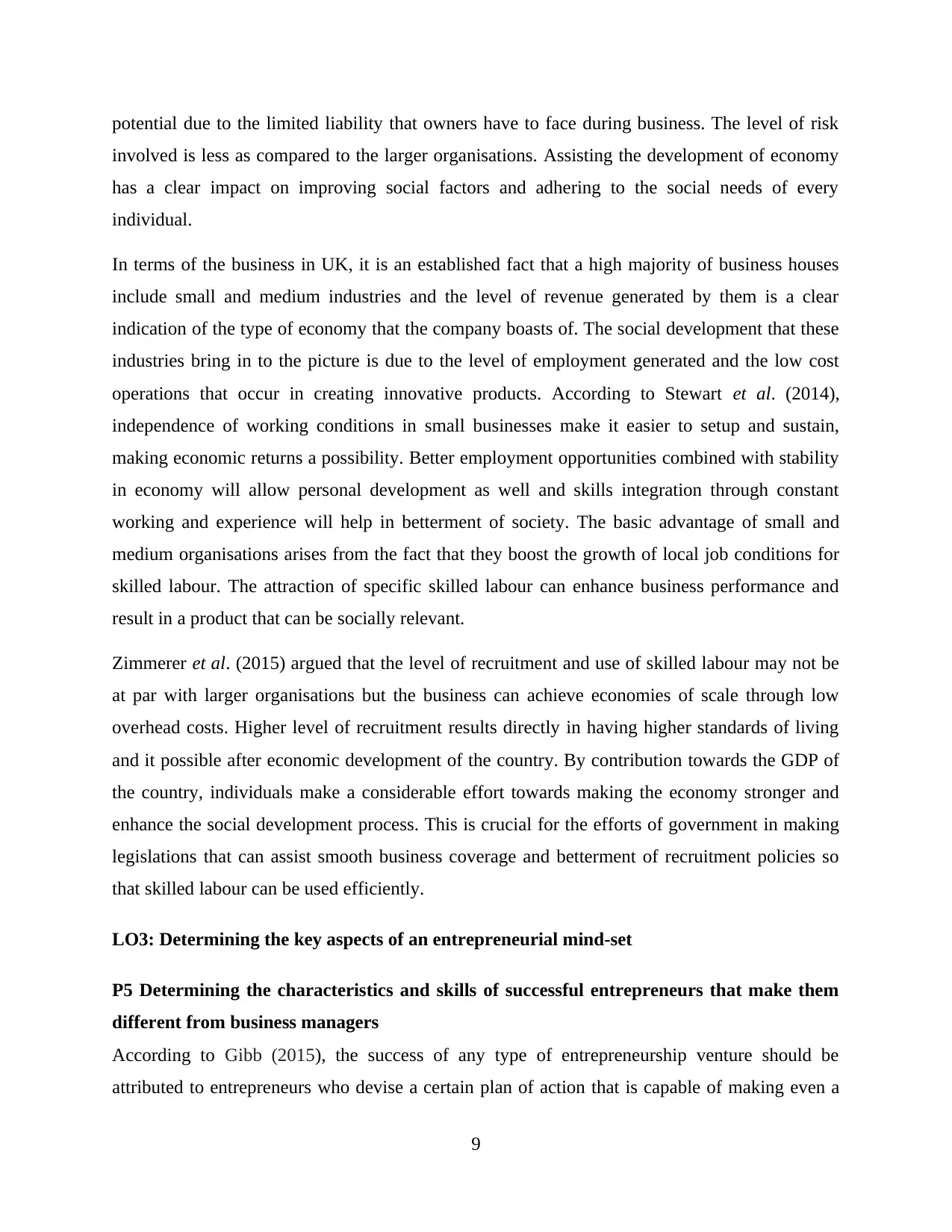
potential due to the limited liability that owners have to face during business. The level of risk
involved is less as compared to the larger organisations. Assisting the development of economy
has a clear impact on improving social factors and adhering to the social needs of every
individual.
In terms of the business in UK, it is an established fact that a high majority of business houses
include small and medium industries and the level of revenue generated by them is a clear
indication of the type of economy that the company boasts of. The social development that these
industries bring in to the picture is due to the level of employment generated and the low cost
operations that occur in creating innovative products. According to Stewart et al. (2014),
independence of working conditions in small businesses make it easier to setup and sustain,
making economic returns a possibility. Better employment opportunities combined with stability
in economy will allow personal development as well and skills integration through constant
working and experience will help in betterment of society. The basic advantage of small and
medium organisations arises from the fact that they boost the growth of local job conditions for
skilled labour. The attraction of specific skilled labour can enhance business performance and
result in a product that can be socially relevant.
Zimmerer et al. (2015) argued that the level of recruitment and use of skilled labour may not be
at par with larger organisations but the business can achieve economies of scale through low
overhead costs. Higher level of recruitment results directly in having higher standards of living
and it possible after economic development of the country. By contribution towards the GDP of
the country, individuals make a considerable effort towards making the economy stronger and
enhance the social development process. This is crucial for the efforts of government in making
legislations that can assist smooth business coverage and betterment of recruitment policies so
that skilled labour can be used efficiently.
LO3: Determining the key aspects of an entrepreneurial mind-set
P5 Determining the characteristics and skills of successful entrepreneurs that make them
different from business managers
According to Gibb (2015), the success of any type of entrepreneurship venture should be
attributed to entrepreneurs who devise a certain plan of action that is capable of making even a
9
involved is less as compared to the larger organisations. Assisting the development of economy
has a clear impact on improving social factors and adhering to the social needs of every
individual.
In terms of the business in UK, it is an established fact that a high majority of business houses
include small and medium industries and the level of revenue generated by them is a clear
indication of the type of economy that the company boasts of. The social development that these
industries bring in to the picture is due to the level of employment generated and the low cost
operations that occur in creating innovative products. According to Stewart et al. (2014),
independence of working conditions in small businesses make it easier to setup and sustain,
making economic returns a possibility. Better employment opportunities combined with stability
in economy will allow personal development as well and skills integration through constant
working and experience will help in betterment of society. The basic advantage of small and
medium organisations arises from the fact that they boost the growth of local job conditions for
skilled labour. The attraction of specific skilled labour can enhance business performance and
result in a product that can be socially relevant.
Zimmerer et al. (2015) argued that the level of recruitment and use of skilled labour may not be
at par with larger organisations but the business can achieve economies of scale through low
overhead costs. Higher level of recruitment results directly in having higher standards of living
and it possible after economic development of the country. By contribution towards the GDP of
the country, individuals make a considerable effort towards making the economy stronger and
enhance the social development process. This is crucial for the efforts of government in making
legislations that can assist smooth business coverage and betterment of recruitment policies so
that skilled labour can be used efficiently.
LO3: Determining the key aspects of an entrepreneurial mind-set
P5 Determining the characteristics and skills of successful entrepreneurs that make them
different from business managers
According to Gibb (2015), the success of any type of entrepreneurship venture should be
attributed to entrepreneurs who devise a certain plan of action that is capable of making even a
9
⊘ This is a preview!⊘
Do you want full access?
Subscribe today to unlock all pages.

Trusted by 1+ million students worldwide
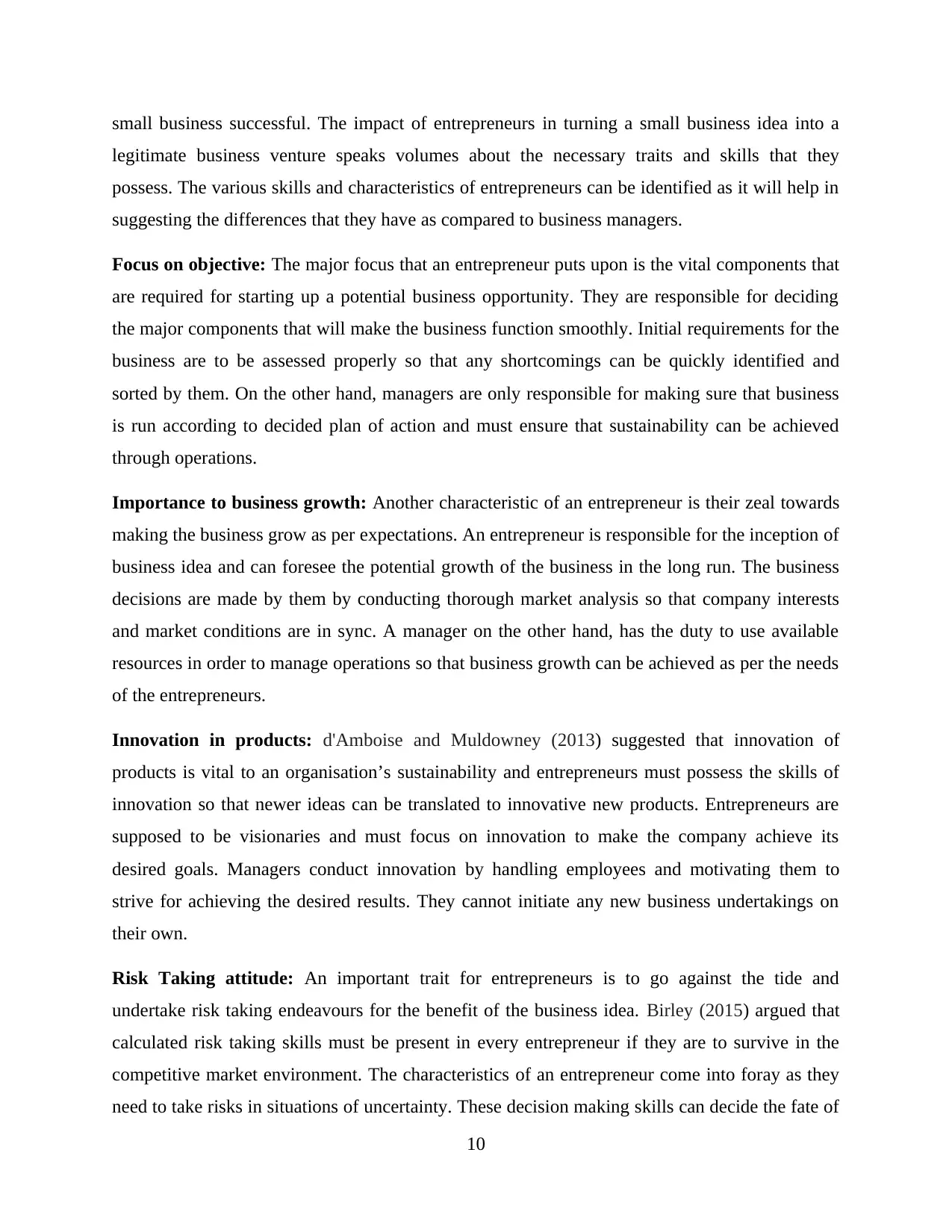
small business successful. The impact of entrepreneurs in turning a small business idea into a
legitimate business venture speaks volumes about the necessary traits and skills that they
possess. The various skills and characteristics of entrepreneurs can be identified as it will help in
suggesting the differences that they have as compared to business managers.
Focus on objective: The major focus that an entrepreneur puts upon is the vital components that
are required for starting up a potential business opportunity. They are responsible for deciding
the major components that will make the business function smoothly. Initial requirements for the
business are to be assessed properly so that any shortcomings can be quickly identified and
sorted by them. On the other hand, managers are only responsible for making sure that business
is run according to decided plan of action and must ensure that sustainability can be achieved
through operations.
Importance to business growth: Another characteristic of an entrepreneur is their zeal towards
making the business grow as per expectations. An entrepreneur is responsible for the inception of
business idea and can foresee the potential growth of the business in the long run. The business
decisions are made by them by conducting thorough market analysis so that company interests
and market conditions are in sync. A manager on the other hand, has the duty to use available
resources in order to manage operations so that business growth can be achieved as per the needs
of the entrepreneurs.
Innovation in products: d'Amboise and Muldowney (2013) suggested that innovation of
products is vital to an organisation’s sustainability and entrepreneurs must possess the skills of
innovation so that newer ideas can be translated to innovative new products. Entrepreneurs are
supposed to be visionaries and must focus on innovation to make the company achieve its
desired goals. Managers conduct innovation by handling employees and motivating them to
strive for achieving the desired results. They cannot initiate any new business undertakings on
their own.
Risk Taking attitude: An important trait for entrepreneurs is to go against the tide and
undertake risk taking endeavours for the benefit of the business idea. Birley (2015) argued that
calculated risk taking skills must be present in every entrepreneur if they are to survive in the
competitive market environment. The characteristics of an entrepreneur come into foray as they
need to take risks in situations of uncertainty. These decision making skills can decide the fate of
10
legitimate business venture speaks volumes about the necessary traits and skills that they
possess. The various skills and characteristics of entrepreneurs can be identified as it will help in
suggesting the differences that they have as compared to business managers.
Focus on objective: The major focus that an entrepreneur puts upon is the vital components that
are required for starting up a potential business opportunity. They are responsible for deciding
the major components that will make the business function smoothly. Initial requirements for the
business are to be assessed properly so that any shortcomings can be quickly identified and
sorted by them. On the other hand, managers are only responsible for making sure that business
is run according to decided plan of action and must ensure that sustainability can be achieved
through operations.
Importance to business growth: Another characteristic of an entrepreneur is their zeal towards
making the business grow as per expectations. An entrepreneur is responsible for the inception of
business idea and can foresee the potential growth of the business in the long run. The business
decisions are made by them by conducting thorough market analysis so that company interests
and market conditions are in sync. A manager on the other hand, has the duty to use available
resources in order to manage operations so that business growth can be achieved as per the needs
of the entrepreneurs.
Innovation in products: d'Amboise and Muldowney (2013) suggested that innovation of
products is vital to an organisation’s sustainability and entrepreneurs must possess the skills of
innovation so that newer ideas can be translated to innovative new products. Entrepreneurs are
supposed to be visionaries and must focus on innovation to make the company achieve its
desired goals. Managers conduct innovation by handling employees and motivating them to
strive for achieving the desired results. They cannot initiate any new business undertakings on
their own.
Risk Taking attitude: An important trait for entrepreneurs is to go against the tide and
undertake risk taking endeavours for the benefit of the business idea. Birley (2015) argued that
calculated risk taking skills must be present in every entrepreneur if they are to survive in the
competitive market environment. The characteristics of an entrepreneur come into foray as they
need to take risks in situations of uncertainty. These decision making skills can decide the fate of
10
Paraphrase This Document
Need a fresh take? Get an instant paraphrase of this document with our AI Paraphraser
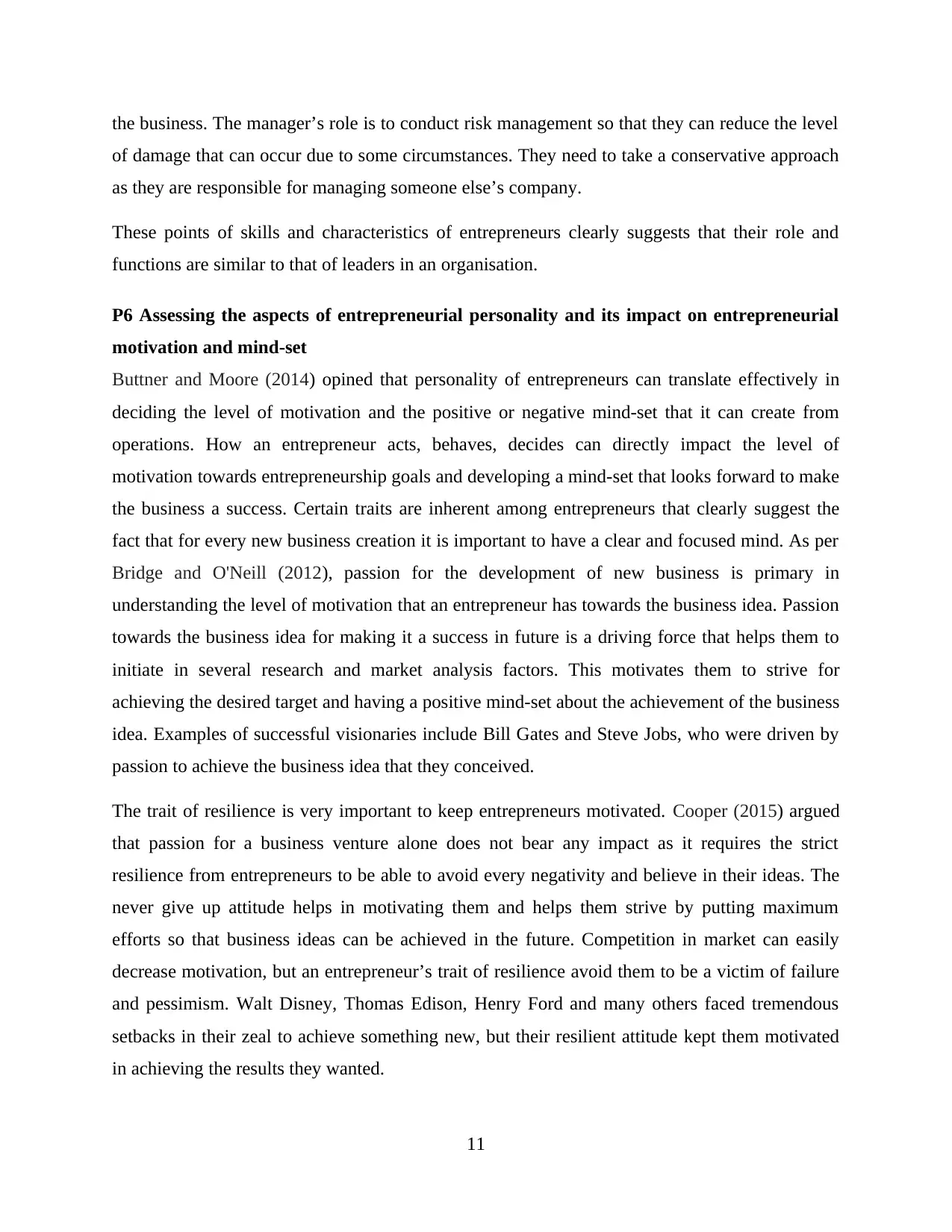
the business. The manager’s role is to conduct risk management so that they can reduce the level
of damage that can occur due to some circumstances. They need to take a conservative approach
as they are responsible for managing someone else’s company.
These points of skills and characteristics of entrepreneurs clearly suggests that their role and
functions are similar to that of leaders in an organisation.
P6 Assessing the aspects of entrepreneurial personality and its impact on entrepreneurial
motivation and mind-set
Buttner and Moore (2014) opined that personality of entrepreneurs can translate effectively in
deciding the level of motivation and the positive or negative mind-set that it can create from
operations. How an entrepreneur acts, behaves, decides can directly impact the level of
motivation towards entrepreneurship goals and developing a mind-set that looks forward to make
the business a success. Certain traits are inherent among entrepreneurs that clearly suggest the
fact that for every new business creation it is important to have a clear and focused mind. As per
Bridge and O'Neill (2012), passion for the development of new business is primary in
understanding the level of motivation that an entrepreneur has towards the business idea. Passion
towards the business idea for making it a success in future is a driving force that helps them to
initiate in several research and market analysis factors. This motivates them to strive for
achieving the desired target and having a positive mind-set about the achievement of the business
idea. Examples of successful visionaries include Bill Gates and Steve Jobs, who were driven by
passion to achieve the business idea that they conceived.
The trait of resilience is very important to keep entrepreneurs motivated. Cooper (2015) argued
that passion for a business venture alone does not bear any impact as it requires the strict
resilience from entrepreneurs to be able to avoid every negativity and believe in their ideas. The
never give up attitude helps in motivating them and helps them strive by putting maximum
efforts so that business ideas can be achieved in the future. Competition in market can easily
decrease motivation, but an entrepreneur’s trait of resilience avoid them to be a victim of failure
and pessimism. Walt Disney, Thomas Edison, Henry Ford and many others faced tremendous
setbacks in their zeal to achieve something new, but their resilient attitude kept them motivated
in achieving the results they wanted.
11
of damage that can occur due to some circumstances. They need to take a conservative approach
as they are responsible for managing someone else’s company.
These points of skills and characteristics of entrepreneurs clearly suggests that their role and
functions are similar to that of leaders in an organisation.
P6 Assessing the aspects of entrepreneurial personality and its impact on entrepreneurial
motivation and mind-set
Buttner and Moore (2014) opined that personality of entrepreneurs can translate effectively in
deciding the level of motivation and the positive or negative mind-set that it can create from
operations. How an entrepreneur acts, behaves, decides can directly impact the level of
motivation towards entrepreneurship goals and developing a mind-set that looks forward to make
the business a success. Certain traits are inherent among entrepreneurs that clearly suggest the
fact that for every new business creation it is important to have a clear and focused mind. As per
Bridge and O'Neill (2012), passion for the development of new business is primary in
understanding the level of motivation that an entrepreneur has towards the business idea. Passion
towards the business idea for making it a success in future is a driving force that helps them to
initiate in several research and market analysis factors. This motivates them to strive for
achieving the desired target and having a positive mind-set about the achievement of the business
idea. Examples of successful visionaries include Bill Gates and Steve Jobs, who were driven by
passion to achieve the business idea that they conceived.
The trait of resilience is very important to keep entrepreneurs motivated. Cooper (2015) argued
that passion for a business venture alone does not bear any impact as it requires the strict
resilience from entrepreneurs to be able to avoid every negativity and believe in their ideas. The
never give up attitude helps in motivating them and helps them strive by putting maximum
efforts so that business ideas can be achieved in the future. Competition in market can easily
decrease motivation, but an entrepreneur’s trait of resilience avoid them to be a victim of failure
and pessimism. Walt Disney, Thomas Edison, Henry Ford and many others faced tremendous
setbacks in their zeal to achieve something new, but their resilient attitude kept them motivated
in achieving the results they wanted.
11
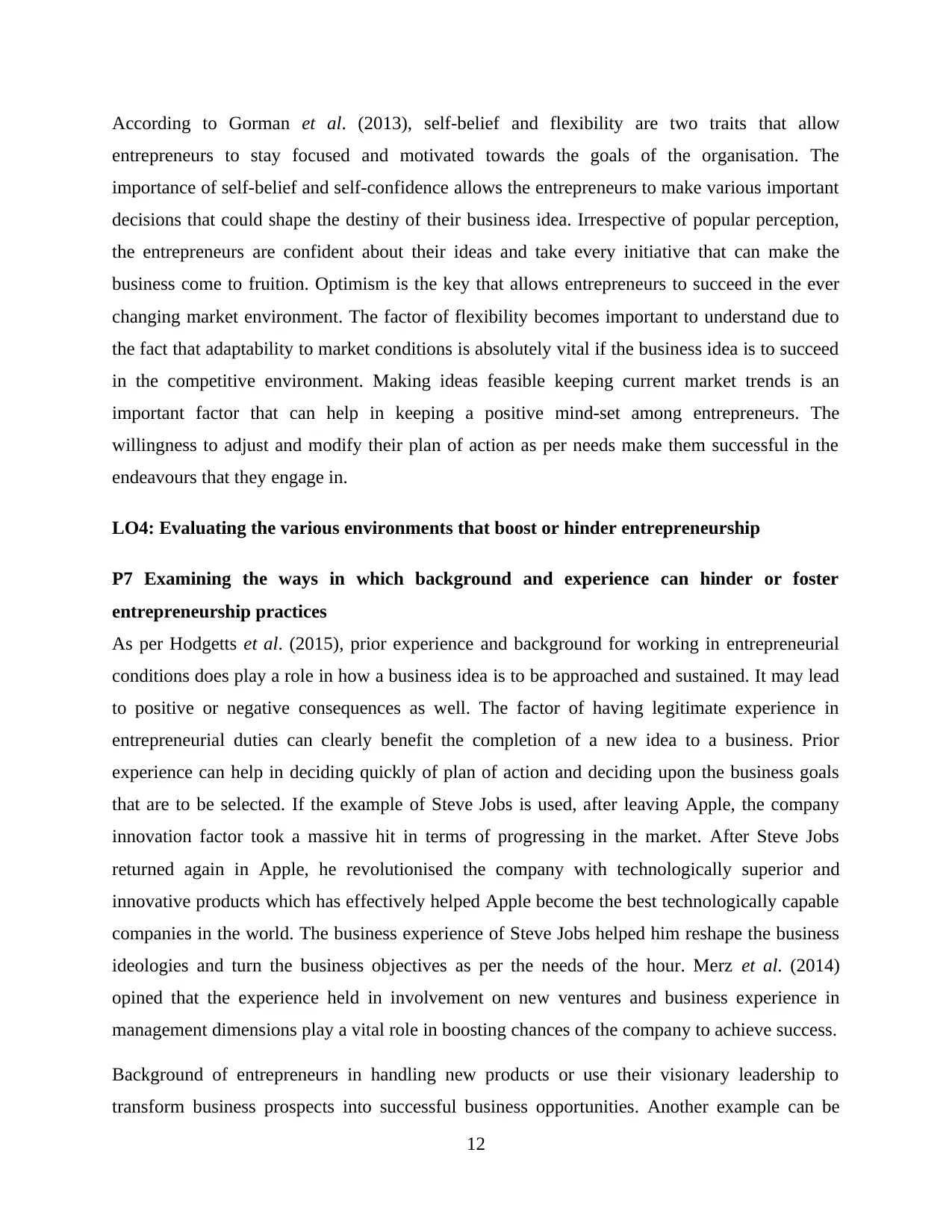
According to Gorman et al. (2013), self-belief and flexibility are two traits that allow
entrepreneurs to stay focused and motivated towards the goals of the organisation. The
importance of self-belief and self-confidence allows the entrepreneurs to make various important
decisions that could shape the destiny of their business idea. Irrespective of popular perception,
the entrepreneurs are confident about their ideas and take every initiative that can make the
business come to fruition. Optimism is the key that allows entrepreneurs to succeed in the ever
changing market environment. The factor of flexibility becomes important to understand due to
the fact that adaptability to market conditions is absolutely vital if the business idea is to succeed
in the competitive environment. Making ideas feasible keeping current market trends is an
important factor that can help in keeping a positive mind-set among entrepreneurs. The
willingness to adjust and modify their plan of action as per needs make them successful in the
endeavours that they engage in.
LO4: Evaluating the various environments that boost or hinder entrepreneurship
P7 Examining the ways in which background and experience can hinder or foster
entrepreneurship practices
As per Hodgetts et al. (2015), prior experience and background for working in entrepreneurial
conditions does play a role in how a business idea is to be approached and sustained. It may lead
to positive or negative consequences as well. The factor of having legitimate experience in
entrepreneurial duties can clearly benefit the completion of a new idea to a business. Prior
experience can help in deciding quickly of plan of action and deciding upon the business goals
that are to be selected. If the example of Steve Jobs is used, after leaving Apple, the company
innovation factor took a massive hit in terms of progressing in the market. After Steve Jobs
returned again in Apple, he revolutionised the company with technologically superior and
innovative products which has effectively helped Apple become the best technologically capable
companies in the world. The business experience of Steve Jobs helped him reshape the business
ideologies and turn the business objectives as per the needs of the hour. Merz et al. (2014)
opined that the experience held in involvement on new ventures and business experience in
management dimensions play a vital role in boosting chances of the company to achieve success.
Background of entrepreneurs in handling new products or use their visionary leadership to
transform business prospects into successful business opportunities. Another example can be
12
entrepreneurs to stay focused and motivated towards the goals of the organisation. The
importance of self-belief and self-confidence allows the entrepreneurs to make various important
decisions that could shape the destiny of their business idea. Irrespective of popular perception,
the entrepreneurs are confident about their ideas and take every initiative that can make the
business come to fruition. Optimism is the key that allows entrepreneurs to succeed in the ever
changing market environment. The factor of flexibility becomes important to understand due to
the fact that adaptability to market conditions is absolutely vital if the business idea is to succeed
in the competitive environment. Making ideas feasible keeping current market trends is an
important factor that can help in keeping a positive mind-set among entrepreneurs. The
willingness to adjust and modify their plan of action as per needs make them successful in the
endeavours that they engage in.
LO4: Evaluating the various environments that boost or hinder entrepreneurship
P7 Examining the ways in which background and experience can hinder or foster
entrepreneurship practices
As per Hodgetts et al. (2015), prior experience and background for working in entrepreneurial
conditions does play a role in how a business idea is to be approached and sustained. It may lead
to positive or negative consequences as well. The factor of having legitimate experience in
entrepreneurial duties can clearly benefit the completion of a new idea to a business. Prior
experience can help in deciding quickly of plan of action and deciding upon the business goals
that are to be selected. If the example of Steve Jobs is used, after leaving Apple, the company
innovation factor took a massive hit in terms of progressing in the market. After Steve Jobs
returned again in Apple, he revolutionised the company with technologically superior and
innovative products which has effectively helped Apple become the best technologically capable
companies in the world. The business experience of Steve Jobs helped him reshape the business
ideologies and turn the business objectives as per the needs of the hour. Merz et al. (2014)
opined that the experience held in involvement on new ventures and business experience in
management dimensions play a vital role in boosting chances of the company to achieve success.
Background of entrepreneurs in handling new products or use their visionary leadership to
transform business prospects into successful business opportunities. Another example can be
12
⊘ This is a preview!⊘
Do you want full access?
Subscribe today to unlock all pages.

Trusted by 1+ million students worldwide
1 out of 16
Related Documents
Your All-in-One AI-Powered Toolkit for Academic Success.
+13062052269
info@desklib.com
Available 24*7 on WhatsApp / Email
![[object Object]](/_next/static/media/star-bottom.7253800d.svg)
Unlock your academic potential
Copyright © 2020–2025 A2Z Services. All Rights Reserved. Developed and managed by ZUCOL.





